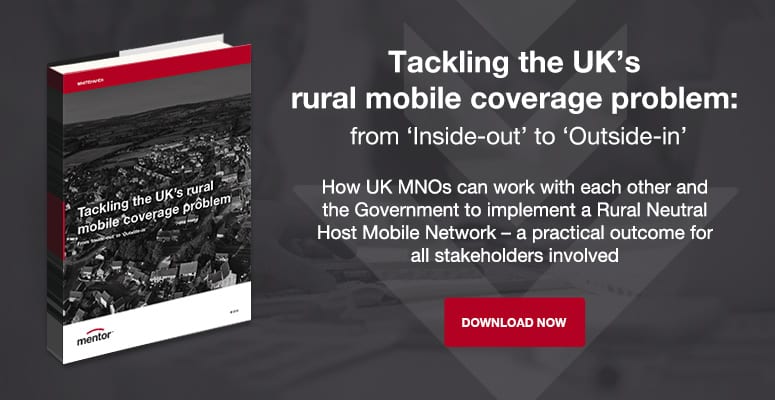How to make a big dent in the rural mobile coverage problem
In this interview with Total Telecom, Mentor’s CEO David Hilliard discusses the state of connectivity in Britain’s rural communities.
What are some of the key challenges in reducing Britain’s digital divide, particularly in rural areas?
The key challenge is that the incentives for MNOs to invest in rural areas are weak. This means MNOs prioritise network investments in locations with the most customers. All new network technologies tend to start their rollout in dense urban areas and eventually flow out to the rural fringe – from ‘Inside-Out’. This is a huge stumbling block for rural coverage – where there are less revenue and higher costs.
Without government intervention, the MNOs focus will always switch to tackling the next technology wave ‘back in the big city’ before the previous one ever reaches the most remote areas.
There’s an opportunity to create incentives for building rural infrastructure and to make sure all service providers can use it.
What roles can spectrum management play in overcoming these challenges?
Spectrum is critical to any mobile network, but the rural fringe brings its own unique challenges. The number of base stations is a key cost driver, so with low revenue density, we need as few as possible. This demands a low-frequency spectrum for best coverage.
We back a mobile-first approach, but using an ‘Outside-In’ scheme to solving the Digital Divide. This would be possible by gathering all of the nation’s sub 1GHz mobile spectrum and assigning it to a purpose-designed rural coverage network.
A mobile-first approach offers indoor and outdoor service for everyone in the area. An integrated approach to the underlying infrastructure will optimise the cost of both Fixed and Mobile services.
Should the UK government be attaching minimum service obligations to the spectrum it puts up for auction?
Gluing obligations to spectrum owners haven’t ever worked for the rural fringe – and we don’t think a single operator approach is sustainable. The government should sponsor the creation of a Neutral Host Mobile Network, using all the sub 1GHz mobile spectrum we have and push the MNOs onto it.
It makes no sense to have one network with a few percentage points of better population coverage than the rest. What we need is a purpose-designed rural coverage network, providing a choice of fixed and mobile service providers – and delivering a knockout blow to the rural coverage problem.
What role can fixed wireless access play in delivering gigabit broadband services to rural locations in the UK?
Point-to-Point fixed wireless technologies have continued to evolve over the years, becoming more affordable and providing higher speeds. Link speeds of up to 1Gb/s are now normal. A rural fibre hub, built as part of a Neutral Host Mobile Network, could offer point-to-point wireless links to local businesses – and to adjacent base stations and broadband cabinets. But it’s doubtful that Gigabit speeds would be achieved. Even so, our preferred solution would be to add radio capacity to the Mobile service through unused 1800MHz spectrum – creating a more localised capacity layer – and leaving the 1GHz capacity for more remote users.
What predictions do you have for the industry over the next 12-18 months?
We offer three predictions:
First, that the Full Fibre ‘gold rush’ will falter when participants realise they need to avoid digging up the same roads. They’d have a more attractive proposition if they offered a more consistent national wholesale service. The fate of UK Cable TV, thirty years ago, should serve as a valuable lesson.
Secondly, UK Mobile Operators will flip from small cell ‘denial’ to ‘evangelism’ – as the capacity crisis bites in our city centres – and when 5G suddenly becomes central to a consumer’s buying decision.
And finally, not what anyone wants – but the 700MHz spectrum will be snapped up by two MNOs who will deploy it across their existing networks. Unfortunately, it won’t have any impact on the 9% unserved parts of the UK.


